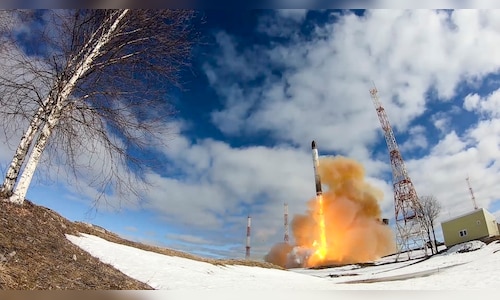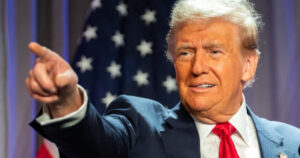
Russia has confirmed firing an experimental hypersonic missile at Ukraine in response to the United States and United Kingdom enabling Kyiv to strike Russian territory with advanced Western weapons. US President Joe Biden approved the use of long-range missiles following reports that Russia had deployed 10,000 North Korean troops in Ukraine.
Russian President Vladimir Putin warned that Moscow reserves the right to target Western nations supplying Kyiv with weapons capable of striking Russian soil. He stated that civilians would be notified in advance of further strikes involving these weapons and described the conflict as having “acquired elements of a global character.”
Meanwhile, NATO and Ukrainian leaders are set to convene in Brussels to discuss the attack. Ukrainian President Volodymyr Zelenskyy condemned the use of the new missile, calling it a “clear and severe escalation” that demands strong international condemnation.
To analyse the broader implications of this escalation, CNBC-TV18 spoke with Meera Shankar, former Indian Ambassador to the United States, and Ruslan Bortnik, Director of the Ukrainian Institute of Politics.
Below are the excerpts of the discussion.
Q: Things are not looking very good, but the warning that Putin is sending to the West right now is that we’ve revised our nuclear doctrine, if a nuclear state is helping a non-nuclear state like Ukraine to attack Russia, then they can invoke their nuclear doctrine. This is the message from Putin. They’ve also struck Ukraine with an intercontinental ballistic missile. What’s the big message? Is there a real worry of a severe escalation?
Shankar: I think that this reduces the nuclear threshold. However, Putin has been a little measured in his response, primarily because I think the incoming Donald Trump administration may follow a different policy.
Many leaders close to President-Elect Trump have condemned the decision by the outgoing President, Joe Biden, to allow Ukraine to use longer-range missiles supplied by the US. And then this has been followed by a similar decision by the UK and France to strike territory inside Russia. Till now, Ukraine was using these to strike at Russian forces within Ukrainian territory, so this marked a significant shift in the conflict and the West said that this was in response to Russia’s deployment of 10,000 North Korean troops in Kursk, which marked an escalation.
The sad thing is that it’s like an escalatory ladder from both sides. And while I’m sure that neither side wants to really trigger a very sharp escalation and increase the danger of a nuclear exchange, these kinds of counter-escalatory steps on both sides can lead to an inadvertent exchange. So I think it’s dangerous for both the countries concerned. It’s dangerous for the world, and the sooner the conflict is halted and negotiations begin for a diplomatic solution, I think the better it will be for both countries and the world.
Q: Ukraine has been seeking permission from the West, from UK and the United States to use these long-range missiles against Russia. Do you feel this gives Ukraine greater leverage in any negotiation? The big worry, and what everyone is talking about, is hopefully, this will not trigger World War III.
Bortnik: I think this new escalation will make the real negotiation process closer than it was before, as in this crisis, there is a real threat of possible use of nuclear weapons against Ukraine.
The Russian counter-reaction on the Ukrainian use of long-range weapons gave a few signals. The first signal is Russia is ready to use nuclear weapons against Ukraine. The second signal is especially for Donald Trump. Russia said that it used a middle-range rocket, which was previously prohibited by the special agreement between the (erstwhile) Soviet Union and the United States. And this agreement was broken by Donald Trump in 2019. So maybe it is an invitation from the Russian side for negotiation to Trump directly.
Q: You said this possibly has something to do with North Korean troops supporting Russian troops in this war against Ukraine. But anything more about the timing of the support to Ukraine because Ukraine has been seeking permission from Biden, and Biden has been saying no till now, but giving permission at this stage when the new president in the United States is going to take over in about two months or so. This clearly muddies the water for the next president. Why do you think Joe Biden has taken this decision at this stage?
Shankar: If you want to put a good view on it, then it is to help Ukraine have a better bargaining position because Russia is getting ready with the help also of North Korean troops to try to expel Ukrainian troops from Kursk, which is a region in Russia which Ukraine has held militarily, and this could be a bargaining tip in any subsequent negotiations.
If you want to take a malign view of the decision, then it certainly complicates President Trump’s desire to halt the conflict quickly and to commence discussions to find an end to the war.
So there are two possible reasons, as I said. But from the Russian point of view, since this is an attack on Russian territory, they have indicated clearly that any nuclear weapons state supporting an attack by another country on Russia would be considered as their participation in the war. Secondly, Russia has also changed its nuclear doctrine to say that if there are major attacks on their land, even if it is conventional, they reserve the right to respond with a nuclear retaliation.
Now, the missile that Russia has launched is not an intercontinental ballistic missile, as Ukraine was initially alleging. Russia has clarified that it’s a hypersonic medium-range missile which used a conventional warhead, and the US has confirmed that it was a medium-range missile.
Your previous speaker mentioned that the treaty on Intermediate Nuclear Forces, which had been signed between Mikhail Gorbachev and Ronald Reagan, actually led to both countries removing and destroying their medium-range missiles in Europe because the warning time was very low. But then President Trump walked out of the Intermediate Nuclear Forces Treaty, and the US has said it is going to place missiles in Western Europe. So the Russians are also signalling that they, too, can actually go in for redeploying and reusing medium-range missiles in Europe. Now that’s, again, going to lower the nuclear threshold there. So, I do feel that it would be good if this escalation could be brought to a halt.



